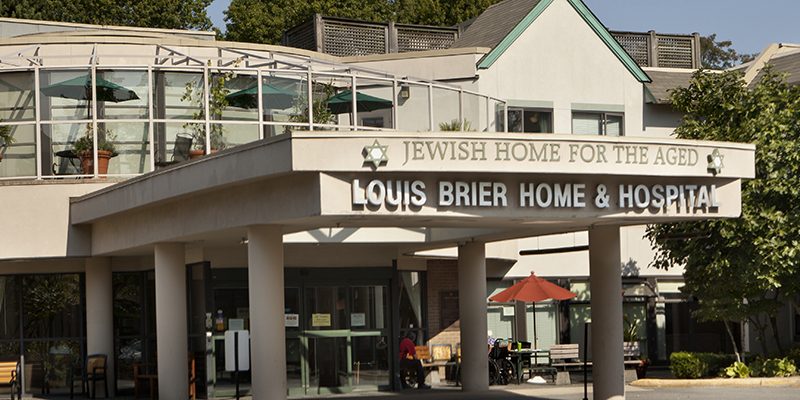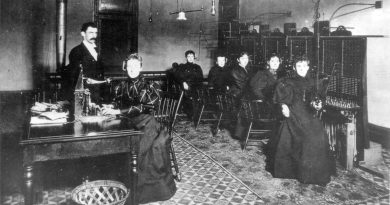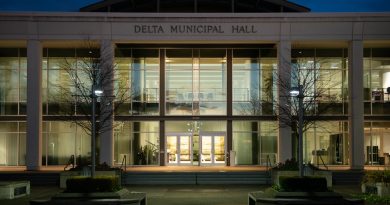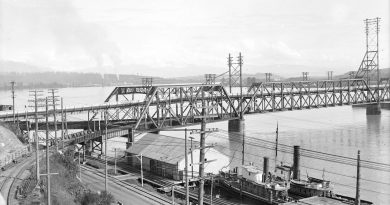1946
Above: Louis Brier Home and Hospital
[Image: www.louisbrier.com/]
*****************************************
You’ll note that these years include events listed under “Also in . . .” These are events for which we don’t have a specific date. If YOU know the specific date of an event shown there, please notify us . . . and cite the source! Many thanks!
*****************************************
January 10 The first meeting of the United Nations was held in New York City.
January 26 Homeless Second World War veterans occupied the old (and vacant) Hotel Vancouver, two blocks east of the present hotel. There was an extreme housing shortage.
January 31 Fletcher Challenge Canada Limited was incorporated.
February 7 The great American bass Paul Robeson performed at the Orpheum today, and 3,000 fans in the sold-out theatre kept him coming back for more and more. The Sun’s Stanley Bligh, in a warm review, commented: “In addition to his great success in the artistic field, the eminent Negro has won an outstanding place in the world by his firm stand on the question of racial equality, his knowledge of languages, international economics and his wide sympathy for the oppressed peoples of the whole globe.”
That sympathy would later get him into trouble—and Vancouver was involved. We’ll explain when we add 1952.
February 14 ELEVEN ‘HUSH-HUSH’ TROOPS DOCK HERE was the headline on a story in the Vancouver Sun about the arrival from Australia of 11 Canadian soldiers who had served in the Pacific war. The war was over, but these men were still “under orders not to talk about their military activities.”
We know today what four of them had been doing. They were Chinese Canadian soldiers from B.C., and had served with a “secret Chinese Guerrilla unit” in the East Indies. The story of the fight Chinese Canadians had to wage to be accepted into our armed forces is too long to tell here. Not one was drafted; they were all volunteers, and served with distinction.
The four men were Sgt. Norman Lowe and Sgt. Louis King of Vancouver, Tpr. Douglas Mar of Port Alberni and Sgt. D. Jung of Victoria. That latter NCO would be Douglas Jung. He was 22 at the time, went on to become the first Chinese Canadian veteran to receive a university education under the auspices of Veteran’s Affairs, and the first Chinese Canadian lawyer to appear before the B.C. Court of Appeal. In 1957 he became Canada’s first Chinese Canadian MP. He won the Burma Star in the war. You can learn more here, and at the Chinese Canadian War Museum at the Chinese Cultural Centre.
Also February 14 Charles Cotterrell died in Vancouver, aged 68. He had retired from the CPR—where he had been assistant general manager—in December, 1945 as a result of illness. He was with the railway for 47 years, had lived in Vancouver for the last 25 years. He was the immediate past president of the Vancouver Board of Trade, elected January 1945.
February 24 Author/teacher Robin Fisher was born in New Zealand. He is the author of, among other books, a 1991 biography, Duff Pattullo of British Columbia. See this site.
March 21 TCG, one of the biggest companies in B.C., and the sponsor of 1946 in The History of Metropolitan Vancouver, had its origins in one automotive replacement glass store: Central Auto & Window Glass Shop opened its doors for business on March 21, 1946. The shop was at 26 McInnis Street (rear of Fogg Motors) in New Westminster. See this site.
April 15 “Mr. Good Evening” died. That’s how Earle Kelly was known to thousands of radio listeners in British Columbia from 1929 to 1946. Gord Lansdell has written a fine tribute to him at this site. It begins: “Earle Kelly was widely known as ‘Canada’s first personality broadcaster.’ Born in Australia to Irish parents, he had been a major in the Intelligence Corps of the Australian Army, and prior to coming to Canada had worked as a journalist in several Commonwealth countries. On his way to an eastern Canadian newspaper in 1925, he stopped in Vancouver, where he joined the Daily Province, later progressing to the position of night editor. Starting in 1929, Kelly’s ‘Good evening” on the Province‘s own station CKCD distinctively boomed forth in what was to become a 17-year tradition of nightly newscasts, seven days a week in British Columbia. . . .” Read more on the site.
April 22 It snowed in Haney, perhaps the latest date on record for that town. And here’s a coincidence linked to that snowfall that we really like, related by Nicole Parton, widow of the late Province columnist Lorne Parton. “This story is almost unbelievable,” she says, “but is completely true.”
She’s recalling their first date (back when she was Nicole Strickland) in 1973. “On that first date,” Nicole writes, “Lorne (who was 15 years my senior) asked me when I was born. I replied that my birthday was April 22, 1946. His jaw dropped, and for a few moments he stared at me in amazement, unable to speak. ‘Then I’ve got something to show you,’ he said, pulling out his wallet. With trembling hands, he extracted a small black-and-white photograph he’d taken as a boy of 15. He was living in Haney at the time, and on the Easter Monday he took the photograph, there was a late snowfall. Thinking how beautiful the Spring trilliums were as their noses poked through the snow, Lorne pressed the date into the snow with gravel: April 22, 1946. When the photos were developed, he tucked that particular picture into his wallet without really knowing why. He carried the photo in his wallet for 27 years, until our first date in 1973. When he pulled the photo from his wallet, we both had a sense that we were destined to be together.”
April 30 As its part in the civic Diamond Jubilee (60th anniversary) celebrations the Vancouver Parks Board hosted a dinner at the Pavilion for nine “Jubilarians,” all born in Vancouver in 1886 after incorporation.
June 4 L.D. Taylor, former mayor, died in Vancouver, aged 88. Born July 22, 1857 in Ann Arbor, Michigan, Taylor arrived in Vancouver September 17, 1896. As Daniel Francis’ 2004 book Mayor Louis Taylor and the Rise of Vancouver makes plain, Louis Denison Taylor was a very interesting fellow indeed. In 1896 he hurriedly left Chicago, where he was in banking, with criminal charges pending against him in connection with accepting deposits when, the charge read, he knew his bank was insolvent. And for a brief period he was married to two women at the same time! He only looked like Caspar Q. Milquetoast.
“Taylor,” Donna Jean McKinnon writes, “was one of the most popular mayors of Vancouver, serving seven times between 1910 and 1934. It was his flamboyance that usually got L.D. back into office, most often during a period of growth and enthusiasm, following a nose-to-the-grindstone administration. A tireless promoter of the amalgamation of Point Grey, South Vancouver and Vancouver, he was, however, not in the mayor’s chair when amalgamation finally occurred in 1929. That honor went to Mayor Malkin, who slipped into office in between Taylor’s two 4-year terms. Taylor was called a courageous, capable administrator and initiator of many civic improvements. He opened the airport at Sea Island, and supported the development of the city archives. Between periods of public office, Taylor published and edited mining newspapers and produced a paper called The Critic, essentially an editorial leaflet on contemporary public issues. Being American-born, Taylor’s property qualifications were challenged twice during his public life. The first came in 1915, when Justice J.J. Clement ruled Taylor lacked property qualifications to serve public office. A by-election a month later returned him. The second challenge came in 1933, but there was no disruption of his term. In that final term the earliest and harshest years of the Great Depression were stripping Vancouver of its possessions and its dignity. Taylor let it be known that unemployed men were expected to go to provincial work camps or have their relief payments cut off. But Taylor’s image with those who supported him in that stand became tarnished when he suspended Chief of Police C.E. Edgett for inefficiency. The next mayor-to-be blamed Taylor for bankrupting the city and that, along with an impression that he was too old for the job, was enough to defeat Taylor in the next three elections.”
June 5 Pat Jacobsen, future CEO of TransLink, was born in St. Thomas, Ontario.
June 8 CKNW’s John Ashbridge was born. It’s Ashbridge’s rich baritone you hear on the PA during Canucks’ games.
June 23 An earthquake felt mostly on Vancouver Island stopped the clock on the Vancouver Block, just as a 1918 quake had done.
July 1 This Dominion Day was the first national holiday since the end of the war, and Vancouver celebrated with a spectacular parade, in the world’s largest outdoor theatre built at Brockton Point. 250,000 people attended.
Also July 1 Steveston held its first Salmon Festival, and Sophie Kuchma, the first Salmon Queen, was crowned. Sophie won the title by selling most tickets to the festival at 10 cents each.
July 7 Vancouver’s first Jewish home for the aged, Louis Brier Home, was opened by comedian and humanitarian Eddie Cantor, who gave a benefit performance in its support. “Early Sunday on July 7,” this web site says, “the stage and screen star and his snowy-haired wife, Ida, officially opened the Home at 1190 West Thirteenth, which was gaily decked in flags for the occasion.” We recommend to those old enough to remember Eddie Cantor to read the Jewish Bulletin web item cited. It’s a fond reminiscence. Today the Home is at 1055 West 41st Avenue.
July 13 Canada’s new Governor General, Field Marshal Viscount Alexander of Tunis, was visiting British Columbia. He was our last British GG, and one of the most popular, a genuine war hero. Alexander had become a major-general in the British Army in 1937 at age 45, the youngest of that rank, and had a distinguished record in World War II—including commanding the rearguard during the Dunkirk evacuation, where he was the last man to leave France. He led the invasions of Sicily and Italy, and was commander-in-chief in the Mediterranean from 1942.
All of which perhaps explains why he became the only white man in the history of the Pacific coast to become, with full tribal rites, a native chief. While he was here, Alexander received a Kwakiutl thunderbird headdress and ceremonial blanket, and became Chief Nakupunkim.
July 28 Beth Israel Cemetery was consecrated.
August 30 The Cascades Drive-In Theatre opened in Burnaby. Cars arrived two hours before the showing of Home in Indiana (a 1944 movie) was to begin. The theatre closed in 1980; the site is now occupied by Cascade Village condominium development.
August Walter Mulligan, a Vancouver police officer with the force since 1927, was named head of the department’s Criminal Investigation Bureau. Mulligan will become chief of the department in 1947.
September 19 C.D. Howe, the “Minister of Everything” (in this case, Transport), officiated at a ceremony in honor of the arrival of the first plane from Australia, and establishment of an air route around the world through the Commonwealth.
October 1 Charles Arthur Banks was sworn in as B.C.’s lieutenant-governor, succeeding William Woodward.
October 11 Quoted in the Province, Cecil Alton, chairman of a special advertising committee of the Vancouver Tourist Association, said: “At least 1,000,000 American tourists will have visited Vancouver this year . . .”
October 23 Restaurateur Umberto Menghi was born in Pontedera, Tuscany, a village halfway between Florence and Pisa. He will open his first restaurant, Umberto’s (in the famous little yellow house on Hornby Street), in 1973.
October 28 Effective today, milk sold in Vancouver had to be pasteurized.
November 4 Robert Davidson, artist, was born in Hydaburg, Alaska. See here.
November 23 Boys band leader Arthur Delamont was named Mr. Good Citizen of 1946, a popular decision. We had always associated Delamont with the Kitsilano Boys Band (founded in 1927), but that group was just one of seven he was leading when this award was made: They also included the bands of West Vancouver, North Vancouver, Point Grey, Grandview, Fairview and the University of B.C. The Hereford-born Delamont had once played with a Salvation Army band in England, led by the composer Edward Elgar.
December 10 West Vancouver voted to discontinue the ferry service to Vancouver.
December 13 George Alexander Walkem, shipbuilder, died in Burnaby, aged 64. He was born July 8, 1872, in Montreal. After graduating from McGill, Walkem joined the Royal Engineers, serving in Egypt and Palestine. He moved to Vancouver in 1898. He was president of West Coast Shipbuilders, Vancouver Iron Works, West Coast Salvage and Construction and Gulf of Georgia Towing. He was elected reeve (mayor) of Point Grey in 1923, was MLA for Richmond-Point Grey from 1924 to 1928 and for Vancouver from 1933. His ashes were scattered over English Bay from the tug George A. Walkem.
Also 1946
The parking meter came to Vancouver, charging one nickel for one hour’s parking.
With the war over, Vancouver Airport was returned to civic control.
This year marked the arrival of the first scheduled overseas airline, Australian National Airways (which later became Qantas).
4,000 people of Japanese descent were sent back to Japan.
Following five years as a pilot in the RCAF, Jack Bell became the first commercial grower of cranberries in B.C. He planted three acres. “Every October,” says one web site, “the cranberries are collected by a unique method called a ‘wet harvest.’ The cranberry fields are flooded with millions of litres of water. Then a gas-powered machine with spinning frames moves through the field, knocking the berries from their vines. The berries float to the surface and farmers use rakes to push them onto conveyor belts and into collection wagons. This method is much quicker than the old method of picking the small berries off their vines by hand.”
W. C. Atherton became president of the Vancouver Real Estate Board.
Earle Birney began teaching literature at UBC. He will continue to 1965, starting along the way (1963) Canada’s first creative writing department.
Riga, Latvia-born (1901) musician Harry Adaskin, one of a prominent musical family, came to Vancouver from Toronto, where he was a founding member of the Hart House Quartet, and established UBC’s faculty of music. He will head the department for 12 years, spend 15 more there as a professor. In his autobiography (two volumes: A Fiddler’s World (1977), A Fiddler’s Choice (1982)), Adaskin wrote he had only to see a person’s hands to completely know him. For more, click here.
Alexander, Manitoba-born Gathie Falk, artist, came to Vancouver with her family. She was 18. Someone wrote that Falk has “revealed the magic found in everyday objects and sites for more than 30 years.” There’s humor, excitement and discovery in her work. See an excellent short bio here.
The first sail-past of the West Vancouver Yacht Club (at Sandy Cove).
The Norsal, which made its maiden voyage in 1922, was sold to the J. Gordon Gibson lumbering family. Gibson will rename her the Maui Lu, sail her to Hawaii.
The last working sailing ship in B.C waters, the Pamir, is towed out of Vancouver harbor with a load of coal for Australia.
The Registered Nurses Association of B.C. (RNABC) obtained its first certification at St. Paul*s Hospital in 1946.
The first female physician was appointed at Essondale Mental Hospital.
Native Voice, a bi-monthly publication from the Native Brotherhood of British Columbia , began publishing.
The famous 2400 Motel on Kingsway opened.
A US-based chain of convenience stores called 7-Eleven adopted that name this year to reflect the fact the stores were open from 7 a.m. to 11 p.m. Today, virtually all 7-Elevens are open 24 hours a day.
This was a year of shortages everywhere. In Cloverdale and White Rock (still a part of Surrey) 264 people were waiting for telephones.
Troll’s restaurant opened in Horseshoe Bay. (A new building would be erected in 1963.)
The number of visitors to Bowen Island reached an all-time high of 101,000 this year.




